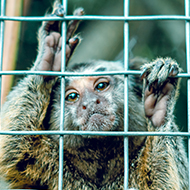BVA calls on government to deliver welfare laws

The Bill will introduce a ban on keeping primates as pets.
The British Veterinary Association (BVA) is calling on the Government to prioritise the Kept Animals Bill in the next parliamentary session, after confirmation this week that the Bill will continue its passage into law via a carryover motion.
The Bill, which had its first reading on 8 June 2021, aims to raise the standards of animal welfare in five key areas, puppy smuggling, live exports, banning the keeping of primates as pets, livestock worrying and zoo regulation and conservation.
All areas covered on the Bill have long been concerns of the BVA, which has campaigned for action in these areas for some time. In a bid to ensure that the Bill moves on through parliament, the BVA is reiterating its importance.
Justine Shotton, BVA president, said: “The Kept Animals Bill is a crucial and long-awaited piece of legislation that promises to address many of what our members have recognised as the most pressing animal health and welfare issues of our times.
“We recognise that some other events have rightly and understandably taken parliamentary priority in recent weeks, but it’s disappointing that this golden opportunity to improve the health and welfare of billions of animals faces a further wait to become a reality.”
When the Bill was first announced, many animal welfare organisations celebrated the upcoming changes in legislation, with RSPCA chief executive Chris Sherwood calling it a 'crucial milestone', and Dogs Trust chief executive Owen Sharp stating that the charity was 'hopeful for the impact the bill could make to dog welfare'.
“BVA urges the Government to put this vital legislation high on the agenda and give it the final push it needs to get over the line as early as possible in the next parliamentary session,” Justine Shotton concluded.



 The latest
The latest